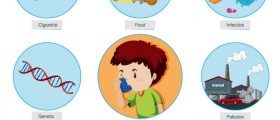
The esophagus connects the throat and the stomach and every bite you take has to pass along this organ in order to be digested. Esophageal cancer may appear in any part of this organ, but according to the type of affected cells, there are adenocarcinoma and squamous cell cancer of the esophagus.
Who can Get Esophageal Cancer?
There are over 14.000 new cases of esophageal cancer diagnosed every year. Because this type of malignancy usually does not cause any symptoms or problems until it progresses significantly, most of these patients (over 90% of them) will die even after some treatment.
Most of the patients in the United States are men suffering from adenocarcinoma of the esophagus, especially Caucasian males. Squamous cell carcinoma is generally more likely to be diagnosed in people of African American descent and men are also much more susceptible to this malignant problem than women. Talking about the age of esophageal cancer patients, they are usually older people, over 65 years of age. Causes of Esophageal Cancer and Prevention
Scientists do not know what causes esophageal cancer, but they have been able to identify several factors which increase the risk to develop this condition. People who smoke or consume large amounts of alcohol are known to be more susceptible to development of esophageal cancer comparing to non-smokers and those who do not drink alcohol. Inhalation of smoke damages esophageal cells’ genetic material and makes you twice more likely to develop esophageal cancer.
Overweight and obesity also raise the chances for esophageal cancer significantly, including increased chances for many other medical problems.Achalasia and tylosis are medical conditions which may lead to development of esophageal cancer in some people. Gastroesophageal reflux disease (GERD) is scientifically proven to lead to esophageal cancer in 30% of the cases. Another medical problem considered as a risk factor is premalignant condition called Barrett’s esophagus, frequently found in GERD patients. A person suffering from Barrett’s esophagus has 50 times higher chances to develop cancer of the esophagus than a healthy individual.
Since there is no evidence what causes esophageal cancer, doctor cannot actually tell how to prevent it. What they can advise is to take care of the risk factors associated with this type of cancer, recommending cessation of smoking and heavy drinking, as well as achieving and maintaining healthy weight. Genetic factors may also contribute to development of esophageal cancer, but you cannot do anything about it.
What everyone should know is that not every person who has some risk factors will develop esophageal cancer. Consult your doctor and ask him or her for advice about cancer prevention.

















Your thoughts on this
Loading...